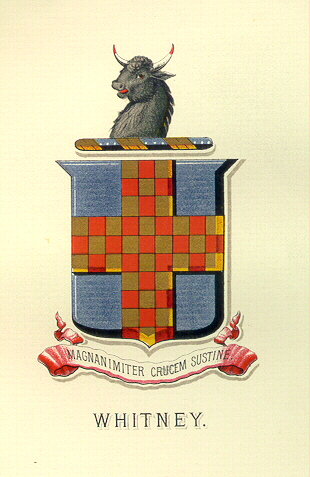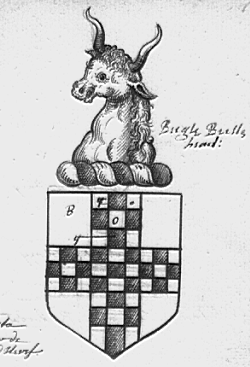Whitneys of Whitney
acelcr
Whitney Family Groups > Medieval Whitney Families > Whitneys of Whitney
Origin
The Whitney family originated with a man named Turstin who came to England with William the Conqueror in 1066 and who probably fought in the Battle of Hastings. He was called 'Turstin Flandrensis' (Turstin of Flanders, Turstin the Fleming) probably because he came from the area known as Flanders. At some point he was given land near Wigmore Castle and was thereafter known as 'Turstin de Wigemore'. Turstin and his wife Agnes had a son Eustace, and Eustace inherited the manor of Pencombe from his mother. Note that the nearby region called Whitney was still at this time ungranted wild land. Sometime in the several unknown generations between Eustace of Pencombe and his descendant Robert de Whitney, probably about 1190, a man was granted the region called Whitney and a castle was built. The family then became known as 'de Whitney' (of Whitney), and the Whitney surname was born.[1]
Primary Male Lineage
Note: The generations of this family prior to James Whitney are currently being analyzed. For more information, see The Ancestry of James Whitney of Whitney.
- Turstin (s1045-a1086) "the Fleming", "de Wigemore", of Wigmore and Pencombe, m. Agnes, daughter of Alfred of Marlborough (s1020-?)
- Eustace (s1075-a1100) of Pencombe
- four to six generations, names have not survived.[2] Due to the fact that later Whitney coats of arms contain a cross, it is thought probable that members in these generations may have participated in the 1st Crusade (1095-99), the 2nd Crusade (1145-48), or the 3rd Crusade (1189-1192).
- Sir Robert de Whitney (b1224-a1242) of Whitney
- Sir Eustace de Whitney (b1256-a1301) of Whitney
- Sir Eustace de Whitney (c1287-c1352) of Whitney, m. (1) Elizabeth de Freville, prob. m. (2) Isabella Gryseley
- Sir Robert de Whitney (1318-c1380) of Whitney
- Sir Robert Whitney (1348-1402) of Whitney, m. Janet Trussell & Maud Cromwell
- Sir Robert Whitney (c1379-1441) of Whitney & Clifford, m. Wenllian Oldcastle
- Sir Eustace Whitney (1410-c1468) of Whitney & Clifford, m. Jennet Russell & Jane Clifford
- Robert Whitney (c1436-a1492) of Whitney, m. Constance Touchet & Alice Vaughn
- James Whitney (s1466-1500) of Whitney & Icombe, m. Blanche Milbourne
- Robert Whitney (s1491-1541) of Icombe, m. Margaret Wye
- Sir Robert Whitney (s1517-1567) of Icombe & Whitney, m. (1) Sybil Baskerville, m. (2) Mary (Berkeley) (Perrot) Jones
- Eustace Whitney (s1545-1608) of Whitney, m. Margaret Vaughan
- Sir Robert Whitney (1592-1653) of Whitney, m. Anne Lucy
- Sir Thomas Whitney (1622-1670), the last Whitney of Whitney, m. Elizabeth Cope
Timeline
<timeline> ImageSize = width:1000px height:auto barincrement:15 PlotArea = left:0 bottom:50px top:0 right:0 TimeAxis = orientation:horizontal
Period = from:990 till:1850 ScaleMajor = unit:year increment:100 start:1000 ScaleMinor = unit:year increment:10 start:1010
DateFormat = yyyy AlignBars = justify
Colors =
id:WRGBack value:rgb(1,1,0.89) id:WRGDark value:rgb(0.29,0.2,0.2) id:WRGLight value:rgb(1,1,0.96) id:WRGMisc1 value:rgb(0.75,0.64,0.46) id:WRGMisc2 value:rgb(0.87,0.82,0.73)
BackgroundColors = canvas:WRGBack
BarData=
bar:title bar:space1 bar:WHI1 bar:WHI2 bar:WHI3 bar:WHI4 bar:WHI5 bar:WHI6 bar:WHI7 bar:WHI8 bar:WHI9 bar:WHI10 bar:WHI11 bar:WHI12 bar:WHI13 bar:WHI14 bar:WHI15 bar:WHI16 bar:space2 bar:title_wars bar:space3 barset:wars bar:space4
PlotData=
mark:(none,black) color:WRGMisc1 fontsize:M width:16 shift:(5,-6) bar:title from:start till:end text:"Whitneys of Whitney" anchor:middle align:center width:15
mark:(none,black) color:WRGMisc1 fontsize:M width:16 shift:(5,-6) bar:title_wars from:start till:end text:"Major Events" anchor:middle align:center width:15
align:left fontsize:M width:5
color:WRGMisc2 bar:WHI1 from:1045 till:1086 shift:(41,-4) text:Turstin bar:WHI2 from:1075 till:1100 shift:(30,-4) text:Eustace bar:WHI3 from:1225 till:1256 shift:(31,-4) text:Sir Robert de Whitney bar:WHI4 from:1256 till:1290 shift:(34,-4) text:Sir Eustace de Whitney bar:WHI5 from:1287 till:1352 shift:(50,-4) text:Sir Eustace de Whitney bar:WHI6 from:1318 till:1380 shift:(50,-4) text:Sir Robert de Whitney bar:WHI7 from:1348 till:1402 shift:(40,-4) text:Sir Robert Whitney bar:WHI8 from:1379 till:1441 shift:(40,-4) text:Sir Robert Whitney bar:WHI9 from:1410 till:1468 shift:(40,-4) text:Sir Eustace Whitney bar:WHI10 from:1436 till:1492 shift:(40,-4) text:Robert Whitney bar:WHI11 from:1466 till:1500 shift:(35,-4) text:James Whitney bar:WHI12 from:1491 till:1541 shift:(40,-4) text:Robert Whitney bar:WHI13 from:1517 till:1567 shift:(40,-4) text:Sir Robert Whitney bar:WHI14 from:1545 till:1608 shift:(45,-4) text:Eustace Whitney bar:WHI15 from:1592 till:1653 shift:(45,-4) text:Sir Robert Whitney bar:WHI16 from:1622 till:1670 shift:(40,-4) text:Sir Thomas Whitney
mark:(line,WRGDark) color:WRGMisc2 width:22 fontsize:S
barset:wars at:1086 text:Norman Conquest barset:break at:1402 text:Castle Destroyed at:1405 text:Battle of Pilleth barset:break at:1730 text:Castle washed away
</timeline>
Related Branches
- Whitneys of Clifford - This branch originated with John Whitney (s1475-?), probably the second son of Robert Whitney of Whitney (c1436-a1473).
- Whitneys of Castleton - This branch originated with Robert Whitney (s1470-?), perhaps the son of Robert Whitney of Whitney (c1436-a1473).
- Whitneys of Clyro - This branch probably originated with Watkin Whitney (s1495-?) who married the daughter and heiress of Jenkin Reese of Clyro.
Primary Holdings
- Early holdings of the ancestors of the Whitneys can be found in the Domesday Book.
- Wigmore - Turstin held land at Wigmore, but not the castle.
- Lingen - Turstin held the Manor at Lingen.
- Cowarne & Pencomb - Agnes, wife of Turstinus Flandrensis was listed as holding "Cuure" (Cowarne) in the Domesday Book in 1086. Pencombe was most likely included.
- Whitney, presumably granted to the family sometime perhaps about 1190.
- Clifford
- Granted to Robert Whitney in 1404.
- Inherited by Eustace Whitney, of Gorsington, Esq., and his heirs from his wife -----, the daughter and heir of William Vaughan, the tyrant of Clifford.
- Icomb, came into the family when James Whitney married co-heiress Blanche Milbourne say 1490.
Resources
- Index of records of the manors of Whitney and Clifford, Herefordshire
- Photograph of the parish church of Whitney
References
1.^ Melville, Henry, A.M., LL.B., The Ancestry of John Whitney: Who, with His Wife Elinor, and Sons John, Richard, Nathaniel, Thomas, and Jonathan, Emigrated from London, England, in the Year 1635, and Settled in Watertown, Massachusetts; the First of the Name in America, and the One from Whom a Great Majority of the Whitneys Now Living in the United States Are Descended (New York, NY: The De Vinne Press, 1896), pp. 13-30.
2.^ "There is a pedigree of the early Lords of Whitney, tracing their descent for five or six generations through a line of Welshmen with unpronounceable names, one of whom, Sir Piedge Exrog, was a 'Knight of ye Round Table. To King Arthyrs time he lived att his Castle at Coedmore in Cardiganshire.' This is to be found in a manuscript book of pedigrees called The Golden Grove, belonging to the Earl of Cawdor and now (1875) in the custody of the Public Record office, Chancery Lane. It was compiled, about 1703, by Owen Thomas, Deputy Assistant to Garter King-at-Arms, from papers and correspondence furnished by living representatives. This pedigree is obviously mythical for many generations." Henry Austin Whitney, The First Known Use of Whitney as a Surname: Its Probable Signification, and Other Data (Boston, MA: Henry Austin Whitney, 1875), p. viii. The first 22 generations of that pedigree have been incorporated by Stephen Whitney Phoenix into the purported ancestry of Henry1 Whitney. See The Whitney Family of Connecticut, and its affiliations; being an attempt to trace the descendants, as well in the female as the male lines, of Henry Whitney, from 1649 to 1878; to which is prefixed some account of the Whitneys of England, p. xxiii. Since some of the generations on that chart are mythical, and others were fabricated, just which parts of that pedigree have historical basis is arguable.
An alternative pedigree may be found in the visitations of Herefordshire taken in 1569 and 1586. See Melville, op. cit., pp. 264, 268, 270. Once again, which parts of that pedigree have historical basis is arguable.

